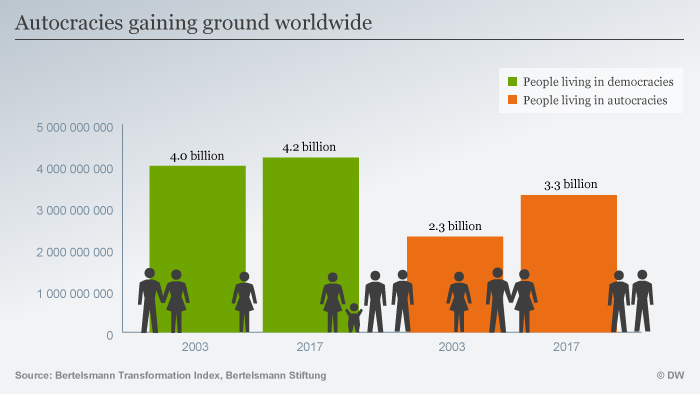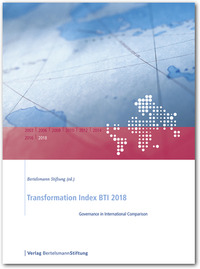
The quality of worldwide democracy and governance has fallen to its lowest level in 12 years, with much of the decline occurring in free societies where some governments rule with an increasingly arbitrary hand, according to a new study from the Bertelsmann Stiftung, a Germany-based think-tank, the FT’s Tony Barber writes:
 Some 3.3bn people are estimated to live under autocratic political systems, the largest number since the research group started its survey in 2006, while 4.2bn people are estimated to live in democracies. Of 129 countries analysed, the Bertelsmann report classifies 71 as democracies and 58 as autocracies. The last survey classified 74 countries as democracies and 55 as autocracies. ….
Some 3.3bn people are estimated to live under autocratic political systems, the largest number since the research group started its survey in 2006, while 4.2bn people are estimated to live in democracies. Of 129 countries analysed, the Bertelsmann report classifies 71 as democracies and 58 as autocracies. The last survey classified 74 countries as democracies and 55 as autocracies. ….
“It is not so much the slight increase in the number of autocracies that is worrying. More problematic is the fact that civil rights are being curtailed and the rule of law undermined in an increasing number of democracies as well,” says the report, released on Thursday. “Former beacons of democratisation such as Brazil, Poland and Turkey are among the countries that have fallen the most.”
“The quality of democracy, market economy and governance has fallen to its lowest level in twelve years on a worldwide average,” the latest Bertelsmann Transformation Index states. Some 40 governments, including some advanced democracies, have curtailed the rule of law over the past two years, and 50 countries have seen restrictions on political freedoms, says BTI, which has regularly measured political and economic trends in 129 developing and transformation countries.
“Many governments are unable to respond adequately to the growing social, ethnic and religious conflicts – or oftentimes even foment these tensions,” the report adds. “From our point of view, a major reason for the poor results is that many governments are not capable or inclined to react to social conflicts by engaging in dialog and seeking a consensus.”
Democracies govern better than autocracies
 Only Burkina Faso and Sri Lanka were making significant progress towards democracy during the period under review, the report observes:
Only Burkina Faso and Sri Lanka were making significant progress towards democracy during the period under review, the report observes:
By contrast, there are a total of 13 countries, including Mozambique, Turkey and Yemen, where the political situation has become significantly worse. Five of these 13 countries no longer meet minimum standards for democracy: Bangladesh, Lebanon, Mozambique, Nicaragua and Uganda, where democracy has been gradually undermined for years, are under autocratic rule. It was often shortcomings in the quality of elections that tipped the balance.
These developments are worrying for citizens because corruption, social exclusion and barriers to fair economic competition continue to be more prevalent in autocracies, the report contends:
According to the BTI, while 12 democracies have combated corruption successfully, only one autocracy did so. Only two autocracies, but eleven democracies have achieved sufficient equal opportunity. 27 democracies, but only two autocracies exhibit well-functioning market and competitive systems.
“The BTI clearly shows that anti-democratic systems are by no means more stable and efficient than democratic ones,” says Aart De Geus, BTI’s CEO.
It is true that China, whose share of the global economy has increased the most in the last ten years, is considered by many to be a prime example of prosperity in a state of absence of freedom, the report adds:
However, those who attribute China’s economic success solely to its political system fail to recognize the predominantly poor economic results of autocracies as a whole – and the dangers of a cult of personality. This can be seen clearly by looking at other autocratic systems such as Russia, Thailand and Venezuela. Here, according to the BTI experts, both economic as well as democratic development have been stagnating for years.
The report, conducted between February 2015 and January 2017, identifies five countries — Bangladesh, Lebanon, Mozambique, Nicaragua and Uganda — as no longer meeting minimum standards of democracy, the FT adds.
“These five new autocracies have crossed a threshold that the defective democracies of Honduras, Hungary, Moldova, Niger, the Philippines and Turkey are nearing, though to varying degrees,” the study says. It judges that Poland, “though much further away, is inching its way downward”.
In east-central Europe, the notion of “illiberal democracy” — a regime in which one party claiming a monopoly on national identity and tradition maintains itself permanently in power — has become part of the political landscape, notes George Weigel, a board member of the National Endowment for Democracy, the Washington-based democracy assistance group. There, too, one finds open talk of the “Salazar model” — a relatively benign authoritarianism that uses state power to manage politics, the economy, and the culture in order to insulate the people from the riptides of post-modernity, he writes for National Affairs.
BTI says the world is experiencing “increasing political instability and a rapid decline in the acceptance of democratic institutions”.
“In more and more countries, government leaders are deliberately undermining the checks and balances designed to hold the executive accountable, thereby securing not only their own power, but a system of patronage and the capacity to divert state resources for their own personal gain,” the report says.
“The long-term trend of increasing restrictions on political freedom and the rule of law continues unabated. While in recent years this was primarily due to greater repression in hardening autocracies, in this study there are above all some relatively advanced transformation countries whose governments are showing a more authoritarian leaning.”







